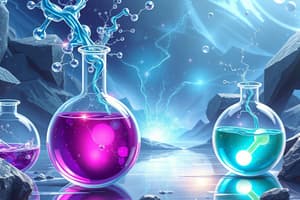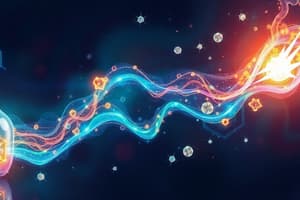Podcast
Questions and Answers
Which of the following is a strong electrolyte?
Which of the following is a strong electrolyte?
- CH3COOH
- NaCl (correct)
- H2SO4 (correct)
- NH4OH
What is the process by which an electrolyte breaks down into ions called?
What is the process by which an electrolyte breaks down into ions called?
- Ionization
- Oxidation
- Decomposition
- Electrolysis (correct)
What is the role of a cathode in an electrolytic cell?
What is the role of a cathode in an electrolytic cell?
- To dissolve the electrolyte
- To supply electrons (correct)
- To oxidize the anode
- To attract cations (correct)
Which of the following substances does NOT conduct electricity?
Which of the following substances does NOT conduct electricity?
According to the Arrhenius theory, what happens to NaCl when it is dissolved in water?
According to the Arrhenius theory, what happens to NaCl when it is dissolved in water?
Study Notes
Lysis
- Solutions like sodium hydroxide (NaOH), copper sulfate (CuSO4), and hydrochloric acid (HCl) are conductive, allowing electricity to pass through.
- Substances such as distilled water, alcohol, petrol, and aqueous sugar solution do not conduct electricity.
- Electrolytes consist of ions, which are charged particles formed during the dissolution of salts in a solvent.
Types of Electrolytes
- Strong Electrolytes: Almost completely ionized in solution; examples include sodium chloride (NaCl), hydrochloric acid (HCl), and potassium hydroxide (KOH).
- Weak Electrolytes: Partially ionized, containing both ions and molecules; examples include acetic acid (CH3COOH) and ammonium hydroxide (NH4OH).
- Electrolytes dissociate into ions when dissolved in a solvent through electron transfer, typically from a metallic component to a non-metallic component (e.g., NaCl dissociates into Na+ and Cl-).
Electrolysis
- Electrolysis is the process where an electrolyte decomposes into ions when an electric current passes through it.
- In electrolysis, an impure metal acts as the anode, while a pure metal serves as the cathode.
- Electrodes: Conductive materials (metal plates, wires, or graphite rods) immersed in the electrolyte, facilitating the entry and exit of electric current.
- The cathode is connected to the negative terminal of a battery, and the anode connects to the positive terminal.
- Electrovalent compounds, formed by cations and anions, undergo ionization readily during electrolysis.
- Electrolytic Cell: Also referred to as a voltameter, it is the vessel where the electrolysis process occurs.
Arrhenius Theory of Ionization
- This theory posits that certain electrolytes, when dissolved in water, dissociate into ions.
- Example reactions include:
- Sodium chloride: NaCl dissociates into Na+ (cation) and Cl- (anion).
- Ammonium hydroxide: NH4OH dissociates into NH4+ and OH-.
- Sulfuric acid: H2SO4 dissociates into 2H+ and SO4-.
Studying That Suits You
Use AI to generate personalized quizzes and flashcards to suit your learning preferences.
Description
This quiz explores the concepts of electrolytes, including the differences between strong and weak electrolytes. It provides insight into which substances conduct electricity and the classification of electrolytes based on their ionization properties.




